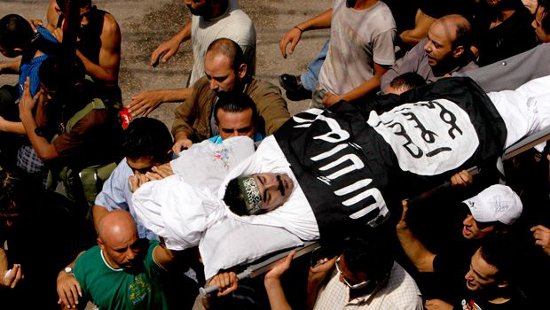|
|
|
Fatah al Islam supporters carry the body of their leader, Abdulrahman Awad. Awad is draped in the flag of the al Qaeda front group the Islamic State of Iraq. Reuters photo. |
The leader of a Lebanon-based al Qaeda affiliate has been killed while attempting to travel to Iraq to join the insurgency.
Abdulrahman Awad, the leader of Fatah al Islam, was killed along with his deputy, Ghazi Faysal Abdullah, by Lebanese security forces during a clash in the Bekaa Valley over the weekend.
Fatah al Islam confirmed the deaths of Awad and Abdullah in a statement released on a jihadi website, and said that the two leaders were traveling to Iraq to join up with the Islamic State of Iraq, al Qaeda’s front group. The statement was discovered by the SITE Intelligence Group and reported by The Associated Press.
According to the Fatah al Islam statement, Awad, a Palestinian, sent his son to Iraq two months ago to become a suicide bomber. There have been no reports of Palestinian suicide bombers carrying out attacks in Iraq in the past two months.
Fatah al Islam’s top leaders are known to have had close links to al Qaeda in Iraq. Shakir al Abssi, the leader of Fatah al Islam up until December 2008, had close ties to Abu Musab al Zarqawi, the deceased leader of al Qaeda in Iraq. Fatah al Islam claimed that Syrian forces killed Abssi in 2008.
Al Qaeda in Iraq continues to use eastern Syria as a staging ground for foreign terrorists entering Iraq, often with the support of Syria’s intelligence service.
Over the past several years, the Lebanese government has sought to dismantle Fatah al Islam. In 2007, the Lebanese military carried out a major offensive against Fatah al Islam in the Nahr al Bared Palestinian refugee camp near Sidon. At least 222 Fatah al Islam terrorists and 171 Lebanese soldiers were killed during the 15-week battle. Two Moroccans were among the Fatah al Islam fighters killed.
Officials fear that Fatah al Islam has penetrated Lebanon’s military. In December 2008, a military prosecutor charged 15 troops with plotting attacks against Lebanese soldiers and having links with the terror group. “We suspect they were coordinating their acts with a Fatah al Islam ring based in the Ein al Hilwah Palestinian refugee camp,” the prosecutor said.
A jailbreak in the summer of 2009 also fueled suspicions of inside support for the terror group. Taha al Hajj Suleiman, a Syrian national and spokesman for Fatah al Islam, escaped from a jail in August 2009. Several prison officials were fired after the Interior Ministry found evidence of “deficiencies that might have facilitated the escape.” Suleiman was detained by police one day later.
In August 2007, the US State Department added Fatah al Islam to the list of terror groups under Executive Order 13224. The terror group is known to have plotted to establish an Islamic Emirate in the Tripoli region in Lebanon. Fatah al Islam has also been linked to several terror attacks and plots in the Middle East, including the September 2008 car bombing in Damascus, Syria, that killed 17 people, and plots to blow up trains in Germany and assassinate anti-Syrian politicians in Lebanon. Abssi was convicted, along with Zarqawi, by a Jordanian court for the murder of USAID representative Laurence Foley. Syria refused to extradite Abssi to Jordan.
Sources:
• Lebanon militants: Leader slain en route to Iraq, The Associated Press
• Lebanese forces shoot dead suspected militant leader, Reuters
• Eastern Syria becoming a new al Qaeda haven, The Long War Journal
• Lebanon charges 15 with plotting attacks on army, AFP
• Lebanese army recaptures escapee terrorist, DPA
• Individuals and Entities Designated by the State Department Under EO 13224, US State Department








